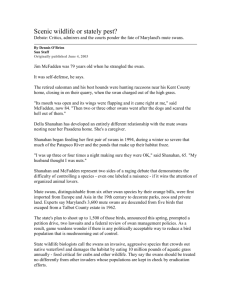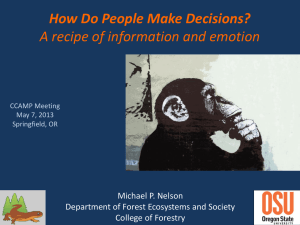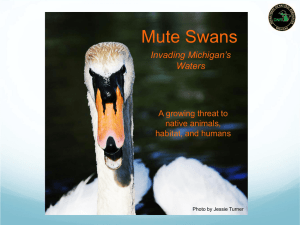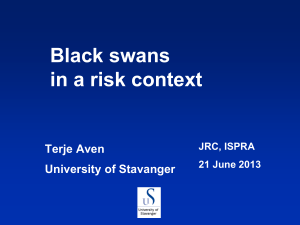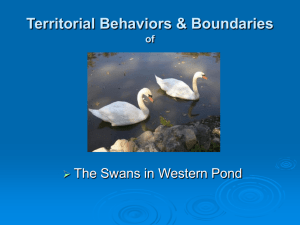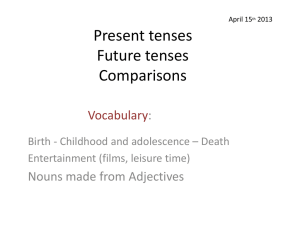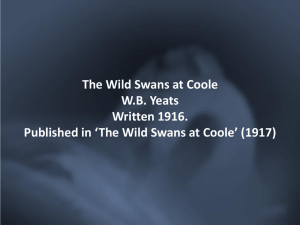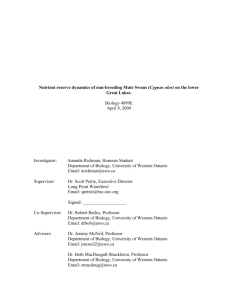Dealing with Wildlife in the PLX
advertisement
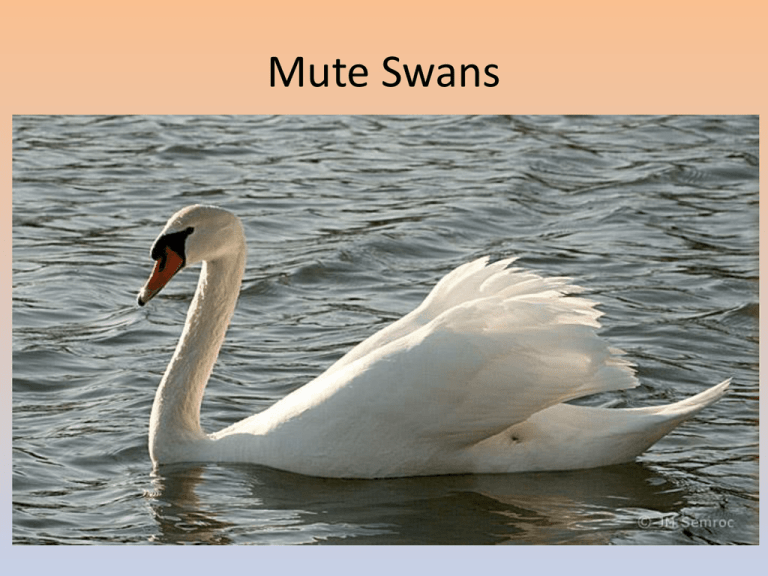
Mute Swans Invasive Species Obligations ORC Charges SP and DOW to manage in the best interest of the natural resources on the lands we own and manage OAC ID Mute Swan Non-Native Trumpeter Swan Native Tundra Swan Native What is a Wild Mute Swan What the DOW uses to determine if a mute swan is wild or not: • Most times not marked (not marked=wild) • Consider ownership to the property owner if owner of Mute Swan can not be determined • Owner liable for damages/injuries though “The Mute Swan has long been appreciated for its beauty and grace, and it has been introduced around the world as a captive, decorative bird. Unfortunately, the Mute Swan has a voracious appetite for plant material, and is highly territorial and aggressive. Captive swans often escape or are released and can disrupt natural ecosystems that they come to reside in. For this reason, many locations have regulations on the ownership of Mute Swans.” (www.rightpet.com) comment from their website • We don’t appreciate people releasing wildlife on state lands without permission • On PLX, no one has claimed ownership of the swans Three Driving DOW Documents DOW Policy 41 Invasive Species Policy It is the policy of the Division of Wildlife to humanely dispatch invasive non-native freeranging terrestrial vertebrates found on Division owned or managed lands. The Division will strongly encourage other land managing agencies to also eliminate these species from their lands. The “American Veterinary Medical Association’s 2007 Guidelines For Euthanasia” will continue to be the standard followed by the Division of Wildlife to humanely euthanize terrestrial vertebrates. Furthermore, the Division will inform and educate the public about the potential adverse effects of invasive non-native freeranging terrestrial species on Ohio’s native wildlife. Goal of any invasive species is complete removal Mute Swans DOW Mute Swan Action Plan The mute swan action plan has 6 specific goals: 1) Educate the public on the adverse consequences of mute swans on the environment 2) Eliminate any mute swan conflicts which involve human safety 3) Reduce competition between mute swans and trumpeter swans 4) Minimize detrimental impacts of mute swans on native wetland birds 5) Prohibit the release of mute swans into the wild 6) Implement control measures to reduce mute swan numbers in Ohio Mute Swans DOW Swan Management Plan The Swan Management Plan has 4 objectives: 1) Public Outreach and Education 2) Population Monitoring and Research 3) Feral Population Management and Resource Protection 4) Relief of Human Safety and Nuisance Conflicts Ohio Population Trends Waterfowl populations can grow rapidly, think of Canada Geese Populations can go from low to a lot quickly 120 Number of mute swans 100 80 60 40 20 20 12 20 10 20 08 20 06 20 04 20 02 20 00 19 98 19 96 19 94 19 92 0 Year Mute swans counted during midwinter waterfowl survey in Ohio,1992-2013 Ohio’s Direction • • • • • Finish management plan Stronger education initiative Improve surveys Continue to manage on state lands Issue permits to private property owners Ohio is not the only one fighting the fight Ohio is not the only one fighting the fight Location of sightings of mute Swans in 2013 by citizen submission Ohio is not the only one fighting the fight Maryland Mean annual rate of population increase was 36% from 1962-78. From 1986 to 1999 the total population in the region increased by 1398% Michigan Highest population. Estimate 10,000 swans in the Great Lakes area Ontario Ontario population is presently about 2,000 birds and is increasing at 10-15%/year At this growth rate, the southern Ontario population will double every 7-8 years. Indiana Must be pinioned and kept in an enclosure that prevents their escape into the wild Oregon and Washington It illegal to import, possess, or sell Mute Swans Minnesota Introduction into the wild is prohibited Possession of captive birds requires a state game farm license and fencing to contain them New York 1,843 swans just on Long Island in 2008 Illegal to possess and getting ready to allow hunting California Unlawful to import, transport, or possess Ohio is not the only one fighting the fight Letter sent to USFWS-Division of Migratory Bird Management (2003) “PLEASE ACCEPT THE COMMENTS FROM THE 25 ORGANIZATIONS REPRESENTING MILLIONS OF AMERICANS IN SUPPORT OF ALTERNATIVE 2, TO REDUCE MUTE SWAN POPULATIONS IN THE EAST BY TWO-THIRDS, AND TO EVENTUALLY ISSUE A DEPREDATION ORDER TO ELIMINATE MUTE SWANS IN THE WILD IN THE U.S” Those that signed letter of support American Bird Conservancy Archbold Biological Station Atlanta Audubon Society Audubon Naturalist Society of the Central-Atlantic States Audubon Pennsylvania Chappee Rapids Audubon Society Cooper Ornithological Society Cornell Laboratory of Ornithology Delmarva Ornithological Society Ducks Unlimited Environmental Defense Georgia Ornithological Society Green-Rock Audubon Society Illinois Audubon Society International Assn. of Fish and Wildlife Agencies Izaack Walton League of America Madison Audubon Society Maryland Ornithological Society National Audubon Society New Jersey Audubon Society Riveredge Bird Club Tennessee Ornithological Society The Waterbird Society Wildlife Management Institute Wisconsin Audubon Council This was in 2003 before Ohio and many other states realized the large increases occurring in their state Mute Swans History of PLX Management ~2003 = Begin getting increased calls on aggression issues-referred to PL State Park 2004 = US FWS removed protection 500 2006 = Began Egg Addling 450 400 2007 = Began removing adults Nests Total Eggs 10 14 11 7 9 9 6 5 71 Birds 90 83 73 45 54 25 14 24 408 350 Birds Killed 42 60 35 30 32 20 13 17 249 300 0 28 13 16 0 4 8 9 78 250 200 150 100 50 0 1 2 3 4 5 6 7 8 Avg Eggs/Nest=5.7 (Validates potential in quick pop. Growth) We exercise professionalism Very labor intensive Showing our commitment to the importance of mgmt We take into account: Human Feelings Bird Humaneness Best Tactic for the Situation Openness to inquiries Mogadore Res. 120 100 80 Nests 60 Eggs Birds Birds Killed 40 This little jump we Believe is due to our neighbor (Congress Lake) allowing production 20 0 2006 2007 2008 2009 2010 2011 2012 2013 Upset Callers We expected this, but….. o Sporadic calls up to this year o Approximately 40 calls within the last 6 months o Even a handful of “Thank You” calls o Most callers understand the why’s once explained to- Proves need for Education Mute Swans Water degradation Ramifications of lack of management Increased conflicts with recreational users (swimming, fishing, boating/kayakers/sailboats, etc.)/loss of revenue Eliminate potential for Trumpeter Swans to nest Aggression towards migratory birds Loss of vegetation Human Safety Swan kills man in Illinois in 2012 Questions Contact Division of Wildlife at 330-644-2293
